Manchester attack: The little-known people who helped save lives
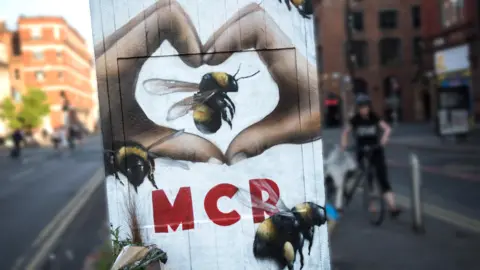 AFP
AFPWhen a bomb went off at Manchester Arena, a number of ordinary people made the decision not to run away from the horror, but to stay to help the injured and dying.
Survivors say the contribution of these people was crucial, yet feel their role has so far been almost entirely overlooked in the official version of events.
As the inquiry begins to hear evidence about the emergency response, we spoke to some of those people. Here are their extraordinary stories.
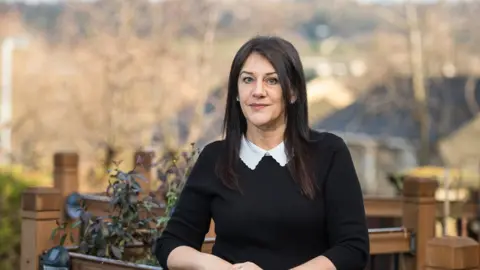 BBC
BBCKim Dick

During lockdown, like everyone else, Kim Dick and Freya Lewis have had to make do with online video calls to stay in touch.
But they're still determined to catch up when they can. Their chats are full of fun - gossip about the soaps, music, and their pets. It's clear they share a special bond. You'd never know that Kim and Freya, 18, were strangers until a few years ago, brought together at the worst time of their lives.
Their worlds collided on 22 May 2017 when a bomb exploded at Manchester Arena. Kim, 57, and her husband Phil were in the arena foyer to collect their daughter and granddaughter from an Ariana Grande concert when the blast blew Kim off her feet.
As she steadied herself and tried to focus through the smoke and debris, a small girl staggered towards her, and collapsed in her arms. It was Freya.
Kim didn't know the then-14-year-old, and didn't have time to think.
"This little girl just appeared," Kim recalls. "There was blood coming out of her mouth, and I thought 'oh my God I've got to look after her. I've got to get her out of here'."
Kim managed to drag Freya towards the door of the foyer and lean her up against a wall. She knew she had to keep her upright to prevent her from choking on the blood which was still pouring out of her mouth. Freya kept sliding down and closing her eyes as Kim strained to hold her up, talking to her non-stop to keep her conscious.
"I said 'OK darling, you're going to be OK'. Just repeating and repeating it the whole time. That's what I thought, after watching (medical dramas) on TV. You've got to keep them awake, keep them alert. Don't let them go to sleep."
As Kim tried to keep the teenager upright, Phil used his car keys to try to cut away plastic from Freya's merchandise bag which had melted into her hair and skin.
Freya was left with 29 separate injuries including two broken legs, a broken arm, severe burns, and a shattered mouth.
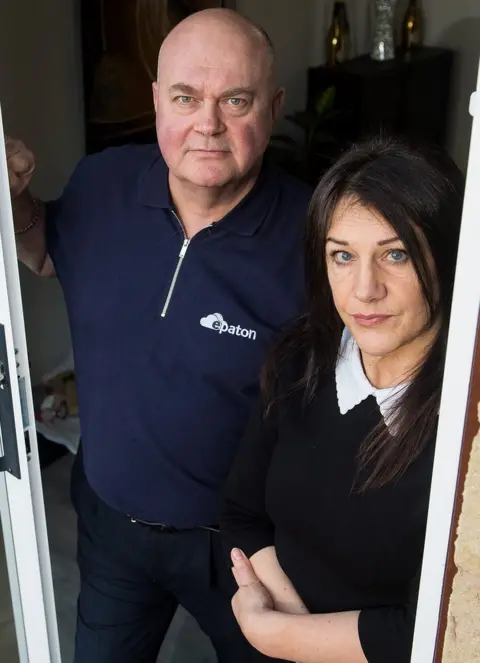 BBC
BBC
And she was not the only one who needed Kim and Phil's help. A second young girl, Aliya, appeared, in pain and crying, with awful injuries to her leg. All Kim could do was tell her to sit down with them and try to keep both children awake and talking.
"At the time I felt really helpless," Kim says. "These girls were bleeding… and we needed the help. We needed the paramedics then."
Kim remembers the sounds of the foyer. The loudspeaker was blaring. She could hear sirens outside, and assumed help would come quickly. But they waited and waited.
"There was screaming, then crying and as time went on the screaming got less and less. The crying was less and less and then it was just total silence. And you knew that people had died."
Kim believes she sat propping Freya up for more than an hour, becoming increasingly desperate for help. "I was shouting out 'Help! We need help!… And I was shouting out to nobody."
With no stretcher available, they had to lift Freya onto a table from one of the merchandise stands, and carry her down the stairs to the station concourse.
Throughout this time, Freya's dad Nick was frantically searching for her. Kim and Phil managed to get Freya's home phone number from her, and spoke to her mum who was desperately waiting for news. Nick then called the couple and with the help of two police officers, was guided through the security cordon.
As father and daughter were reunited, Kim and Phil slipped away. Kim says she still feels guilty for leaving. "There were people on the floor everywhere," she says. It was after 1am when the two girls were taken to hospital, Freya by ambulance, Aliya in a minibus driven by someone who volunteered to help.
'They kept me alive'
Freya was put into an induced coma and underwent many hours of surgery. When she came round, she asked her parents about Kim and Phil.
"I remembered them straight away," she says. "I wanted to know how they were." Two weeks later she got her answer when they visited the hospital and the two families forged a bond they still share.
"Kim and Phil saved my life," Freya says.
"On that night, nobody else seemed to help me. And I just saw Kim, with her arms wide open, and she took care of me straight away. Without thinking I basically collapsed onto her. And she and Phil looked after me and kept me alive.
"She kept my eyes open. She kept me breathing. She kept me as calm as I possibly could be."
After multiple operations and a long rehabilitation, Freya has made an amazing recovery, and is now applying to drama school, with dreams of becoming an actress.
"They acted as my parents when my parents couldn't," she adds. "And for the rest of my life, I'll always be eternally grateful to them. They're just amazing."
 BBC
BBC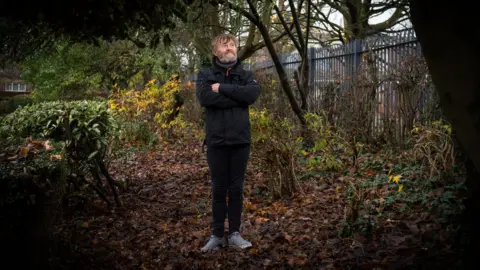 BBC
BBCDaren Buckley

Daren Buckley is a changed man after what happened at the arena. Physically, the difference is shocking; he's lost nearly four stone in weight and the stress has led him to grind most of his teeth away.
The night terrors and flashbacks have stayed with him. In the weeks after the attack he would wake up covered in sweat, having dreamt of people dying in front of him.
He has struggled to come to terms with the lack of official recognition for people who helped, and says he feels completely forgotten.
"How can you run into a bomb and get told you don't matter?" he says, angrily.
"I feel like anybody on the professional side of things has been acknowledged, even the police sniffer dog got an award. To me it is all wrong, the system and how it has worked."
Daren was at the concert with his disabled son Lewis, the pair just about to walk through the doors to the foyer when the bomb went off.
He says he knew immediately it was a suicide bombing and remembers running towards the blast pulling Ariana Grande t-shirts off the merchandise stand and throwing them to people to use as bandages.
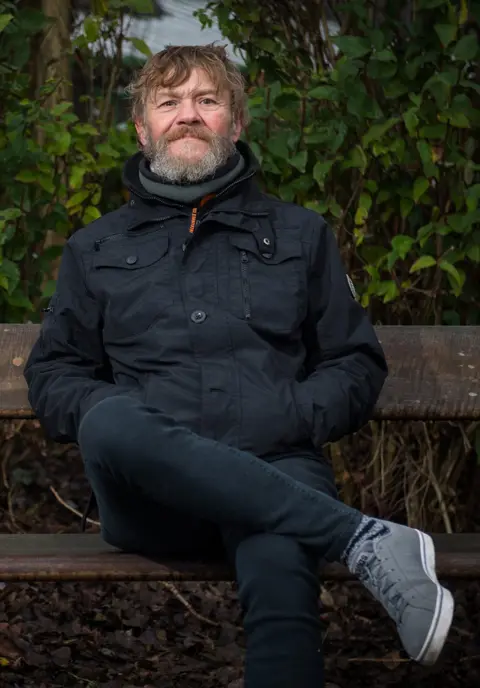 BBC
BBC
"We had t-shirts to save lives. We had nothing else." At one point he asked someone if he could get into a first aid room for extra gloves and bandages, but says he was told all the doors had been locked.
As time ticked on and no more help was coming, Daren helped to carry the injured out of the foyer and down into Victoria Station, where the medical teams were waiting.
Daren has struggled with PTSD ever since the attack. "It's like it's stamped on my brain and I'm thinking how can I get it out?" he says.
"In my dreams I've seen myself dead. I've seen things moving on the floor that shouldn't be. Nobody can see the injuries on me because physically I don't have them, but mentally, I've got hundreds. How do you move forward when you're in that rut of thinking is it going to happen again?"
For Daren, there have been some very low points. But he says the support from the community of survivors has been life-saving for him, as well as the Manchester Survivors Choir. "All I've ever wanted to do was sing," he says. "I'd be lost without music, it keeps you going."
 BBC
BBC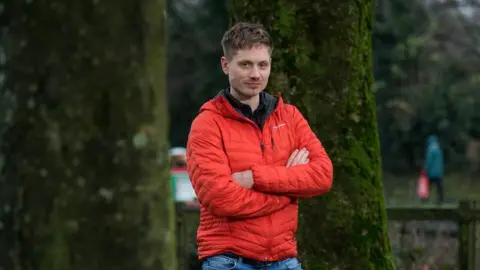 BBC
BBCRob Grew

Rob Grew was in a shop when he heard a loud boom and screams coming from the station. Thinking a train had crashed, he started to run towards the noise, never expecting what would happen over the next six hours.
He reached the foyer within five minutes of the bomb going off.
"It took me a minute or two to decide what to do," he says. "Whether to run back out for my own safety, or go in."
But the sight of a mother and child on the floor screaming for help stopped him from leaving. "That thought went out of my head and I went straight to them, to comfort them."
The girl had multiple shrapnel wounds to her legs, while the mum had a bolt that had gone through her cheek.
"She asked me if I could go and look for her sister in the centre of the foyer which I did… It was just chaos. There were people everywhere on the floor."
He pauses before recalling: "You look at those who are just lying there, bleeding out, and you have no idea what to do at all. So many injuries you've no idea where to start."
'I kept trying to reassure people'
Rob did have some first aid training, and as an adventure sports photographer, had some experience of having to stay calm in dangerous situations. But it was nowhere near the level needed to deal with the scale of what he was faced with.
"It was just autopilot really," he says. "Where do you start with someone who has multiple holes in their torso and legs? I think the only thing I remembered was compression - try and stop the bleeding - and CPR. There were that many people screaming out for help, you've just got to try and cover as many people as you can."
As the minutes ticked by, and despite the reassurances he was giving to the injured, it dawned on Rob and others inside the foyer that no more help was coming in. The focus shifted from tourniquets and bandaging, to getting people out on makeshift stretchers made out of dismantled tables and T-shirt stands.
"I kept trying to reassure people 'don't worry they'll be a few minutes, there's people just outside'. And I kept on saying that for 40 minutes."
He says he could see the flashing lights of ambulances down by the railway station but no-one coming up the steps to help, which meant carrying people down three flights of stairs.
Rob still doesn't know what happened to some of the people he tried to help - whether they lived or died. But there are some who stick out: a woman who passed away next to him as he attended to someone else; two elderly sisters with severe injuries who told him 'don't worry, we're two quite gritty individuals' as he apologised for leaving them and moving on to someone else; and a trainee nurse in a stripy dress who came back after taking her children to safety, and who he says definitely saved lives.
The judgements he made on the night have stayed with him. "I think I put pressure on myself wishing I could have done more to help."
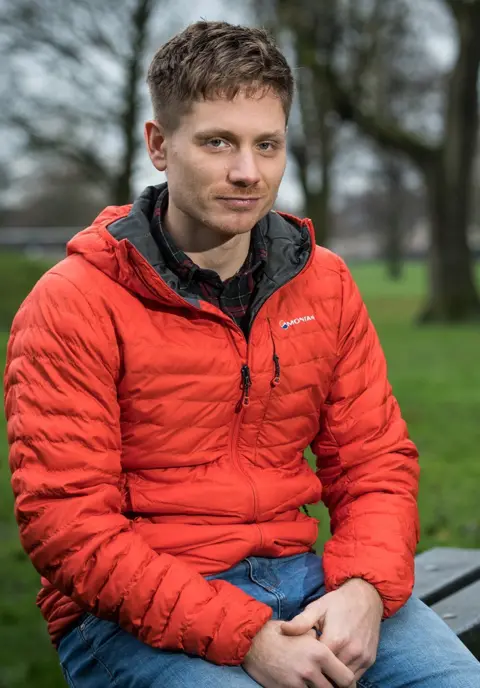 BBC
BBC
There are some who Rob has since been able to identify, like Robby Potter, who he helped carry out of the arena and down to the station. "I found Robby on his back on the bridge to the foyer and he was pretty much unconscious.
"There was a member of the train staff there, knelt beside him, I came back every so often, to see if he was still with us.
"We went and got a table from the T-shirt stand and lifted Robby onto it, with maybe four of us. Robby's a big guy so we struggled to carry him down. That's all I heard of him for a good six weeks or more; I didn't know whether he was alive or dead."
Rob says there was never enough medical help inside the foyer. His focus was on getting people out, and getting them to where help was waiting. A number of times he was mistaken for a doctor, and had to say that he was not qualified to give morphine injections.
'I wish I could have done more'
After the last injured person had been loaded into an ambulance, Rob finally left and walked home covered in blood and still wearing a pair of medical gloves.
"I just walked back to my apartment, got a shower, put all my clothes in a big bag because I wasn't sure if the police would need them. I just chucked them away in the end, they never asked for them."
He says he remembers thinking "how the hell have I walked out of such a crazy thing and just been left? I wasn't spoken to by the police until something like the September".
Rob has never had counselling. Adventure sports became his therapy. He went abroad shortly afterwards, then spent some time climbing mountains in Wales, trying to come to terms with what had happened. For a good period of time he says, he replayed the night over and over again in his head, trying to figure out what he could have done better.
He re-took his first aid course and, while doing CPR training, kept seeing the faces of the injured and dying.
Overall, he has tried to take something positive from it.
"Because you've experienced such shock now you can probably deal with situations better so I like to think next time I'll be one of those people who can help a bit better… I wish I could have done more still."
 BBC
BBC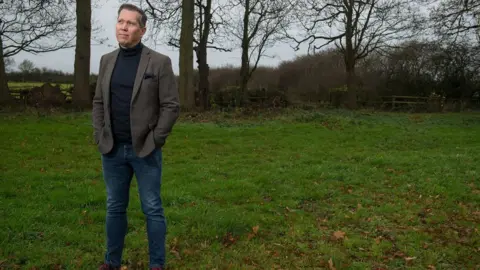 BBC
BBCSean Gardner

Sean Gardner didn't think he'd be at Manchester Arena for long. He was late to pick up his daughter Hannah from the concert, and thought he'd try to park as close as possible. He screeched into a space in the underground car park, and told his other daughter Charlotte to wait while he ran upstairs to collect her sister.
Before Sean could reach the foyer, the bomb went off.
"It was pretty obvious to me what had happened. And then of course, people just came running. And I guess I had a choice at that point."
Instead of turning around, Sean ran against the flow of the crowd. He'd arranged to meet Hannah in the foyer, and he charged towards it, terrified she'd been hurt. But she wasn't there, and he hoped that meant she was safe.
While racing back to his car to reassure his other daughter a woman pleaded with him to stop and help her.
She was unharmed, but her friend Jane Tweddle was badly injured.
"They just needed help. It was as black and white as that… I just felt obliged. It's just human nature."
'I held her hand'
Sean says he quickly realised Jane's injuries were far beyond anything he knew how to treat. "It wasn't enough, but all I did was stay with her and comfort her. And that's all I could do. But it was in the expectation that somebody would be there within minutes."
He says he kept looking towards the doors, thinking he'd see people in uniforms coming through with stretchers.
"I held her hand, and she knew somebody was next to her I suppose. That was the main thing. I told her 'Just hang on in there. It won't be long, they'll be with us'."
He believes it was about 20 minutes before a British Transport Police officer came running past him and he begged her to help while he went to reassure daughter Charlotte about what was happening.
Waiting in the car she'd become hysterical, not knowing what had happened.
"She tried to come upstairs and they wouldn't let her. Somebody told her that people were dead. She didn't know about me. She didn't know about her sister… she thought we were injured at best."
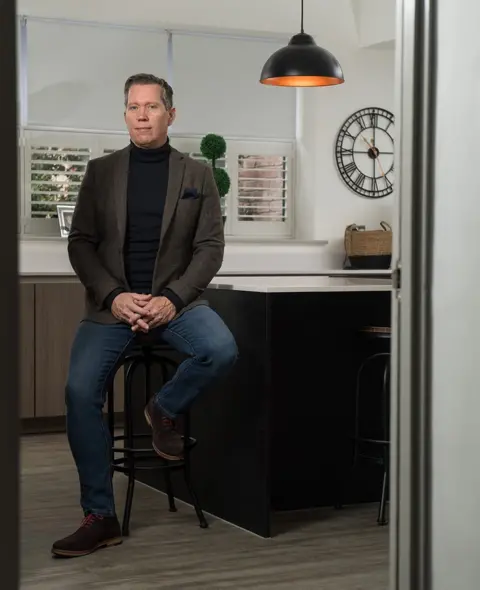 BBC
BBC
Sean told Charlotte he thought Hannah was safe, although he hadn't found her. But he felt he needed to go back to continue looking after Jane.
"Charlotte was really brave. And I said, 'I will be back. But you have to stay here because you're safest here. And once we get Jane sorted out, we can go and find Hannah'."
He returned to Jane's side and waited until more police officers arrived. They made efforts to resuscitate the mother of three. But Jane didn't survive and died with her friend by her side.
He spent the next two hours trying to reunite himself with both of his daughters. Hannah had ended up in a nearby hotel, while Charlotte had been brought out of the car park by a police officer as it was being cordoned off.
Three years on, his family are still living with the haunting memories of the night. Sean has suffered from Post Traumatic Stress Disorder (PTSD) and says he's struggled with a range of emotions.
"It troubles me as to whether I could have done something different. Whether had [the emergency services] been there sooner, the outcome would have been better.
"It troubles me that my daughters had to wait such a long period of time, Charlotte, in particular, to know exactly what was going on. For her, that's so traumatic."
Asked if he feels like a hero, Shaun looks awkward. "No. I don't like labels."
He says he stayed with Jane because he would "hope somebody would do that for me in those circumstances".
"I think it's just humanity to be honest with you. There's probably not enough of it, but I was always brought up that way. I know I'd never do anything different."
 BBC
BBC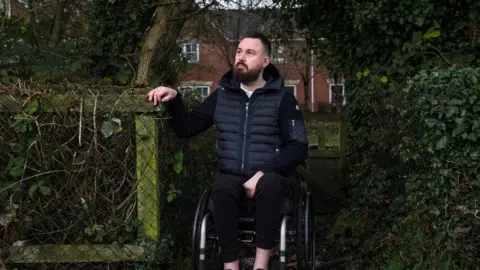 BBC
BBCMartin Hibbert

For survivor Martin Hibbert, the lack of official recognition for the ordinary people who chose to help has been a source of increasing frustration and anger. Not least because he feels their accounts are crucial to piecing together the facts about how the emergency response played out.
Martin remembers little from the hours immediately after the bomb, and it's no wonder; he was hit by 22 separate pieces of shrapnel, including a bolt in his neck which severed an artery, and one in his back which has paralysed him from the waist down.
His only thought was for his teenage daughter, who was also severely injured and lying next to him on the foyer floor. "I knew that I probably wasn't going to make it," he says.
"I was striving to stay alive really to make sure she got out. When I saw her being carted off, that's when the curtains came down."
'Recognition long overdue'
In the three years since, Martin has attempted to piece together the details of what happened to him and his now 18-year-old daughter, but he says it hasn't been easy. He feels that many details in the official reports into the aftermath of the bombing do not tally with the eyewitness accounts of those who were there.
He and others have now formed a network of survivors who can speak with a common voice; but because their bid to play a formal role in the public inquiry has been denied and they don't have access to all the evidence, Martin says many gaps still remain.
Only since the inquiry started has he discovered he arrived at Salford Royal hospital at 1:45am; more than three hours after the explosion, but only a 15 minute drive from the arena.
The inquiry has been told all the injured had been moved out of the foyer by 11:40pm - an hour after the blast. "So what happened to me for two hours after that?" he says. He can only assume he was lying on the station concourse. When he did finally arrive at hospital, he was given 14 pints of blood.
For Martin, proper recognition of the bravery of these members of the public is long overdue and he says, their voices need to be heard.
"As everybody ran out, they ran in.
"Police, fire and ambulance, they are trained for that, but people like Daren Buckley and Rob Grew aren't. For a member of the public to have that instinct, it takes a very special person to do that."
He says for the world not to know about what these people did "just feels wrong".
"They don't want a Queen's honour, or a medal, or a pin badge. They just want recognition for what they did, and recognition that they were there."

Dozens of awards recognising the bravery of police officers, medical staff and other emergency responders have been given out in the years since the Arena attack.
A ceremony recognising the 'supreme courage' of British Transport Police officers and railway staff was held in January 2018, honouring the 'breathtaking bravery' of those who helped.
In October 2018 police sniffer dog Mojo was awarded the animal equivalent of an OBE - the PDSA Order of Merit, for his bravery after spending the night searching for secondary explosives.
Medics received a Pride of Britain award in 2017, while officers from Greater Manchester Police and charity workers were recognised in the Queens Honours in 2019 for their work in the aftermath of the attack.

 BBC
BBCPhotographs by Jon Parker Lee
Update 1 February 2021: This article was amended at the request of one of the families.
